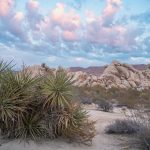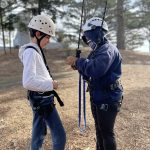Reflections on San Francisco International High School’s Five-Day Expedition
A student stopped in her tracks, awestruck, upon reaching a dry river framed by purple needle grass, tall Western rye, and the oak-shaded trail on which we were hiking. “This place,” she shared aloud, “feels like where I crossed the river, walking from El Salvador into Guatemala.” This glimpse into the life of my student and her readiness to share with me her journey into the United States gave me pause; though we were miles into Henry Coe State Park, each student still carried memories incredibly close to home.
The notion of “home” is charged with particular meaning here. For most students from San Francisco International High School (SFIHS)—all of who have lived in the U.S. for less than four years—home is not necessarily rooted in one country, house, or space. Yet to embark on a five-day backpacking trip with Outward Bound, our students had to overcome their individual anxieties about leaving the comfort zones of their homes to journey into the backcountry with packs heavier than anything they thought they could carry. From my perspective, however, nothing compared to the journey they had already made—from Nepal, Guatemala, El Salvador, China, Mexico, and Brazil—to the inner city of San Francisco.
SFIHS is an example of an urban partnership that lays the groundwork for truly unique outdoor programming that facilitates multicultural exchange, builds community, and allows diversity to enrich the lives of student and educators alike. Throughout the expedition, I saw cultural barriers collapse and transform into venues for some of the most memorable moments I’ve ever experienced on course: lunchtime dance-offs, impromptu bathroom line capoeira and yoga lessons, and freestyle battles at dusk. By the end of the course everyone was also equipped with a few new jokes, puns, and words in at least two other languages.
Needless to say, communication was one of the great difficulties of the course for students and me as an instructor. Varying levels of language proficiency and self-consciousness required ingenuity from us all to make lessons and activities accessible and meaningful. By often challenging students to work silently as a group, my co-instructor and I pushed them as a team to build the trust needed to transcend language all together. Having seen what my students are capable of, I continue to ask myself as an instructor: how can I continue to integrate diversity into curriculum while being responsive toward a variety of learning needs—language and otherwise? On the whole, my experience with SFIHS has reaffirmed my resolve as an educator to move toward more inclusive curriculum while promoting equitable education and access to the outdoors.
Outward Bound changes lives through challenge and discovery in the outdoors, but most importantly through whom those experiences are with. Without a doubt, the rich experience of SFIHS’ course was in part due to each student’s unique perspective as a recent immigrant. As a first-generation American myself, I can’t help but acknowledge the critical role Outward Bound California plays in a larger agenda that aims to further the presence of minority groups as regular participants in the outdoors—a population that is largely underrepresented . As I transition away from teaching with Outward Bound for now, it’s my hope that partnerships supporting inner-city and underrepresented students continue, so that in the future, such students will feel welcome in calling the outdoors “home”—a place that they can share, preserve, and enjoy for generations to come.










